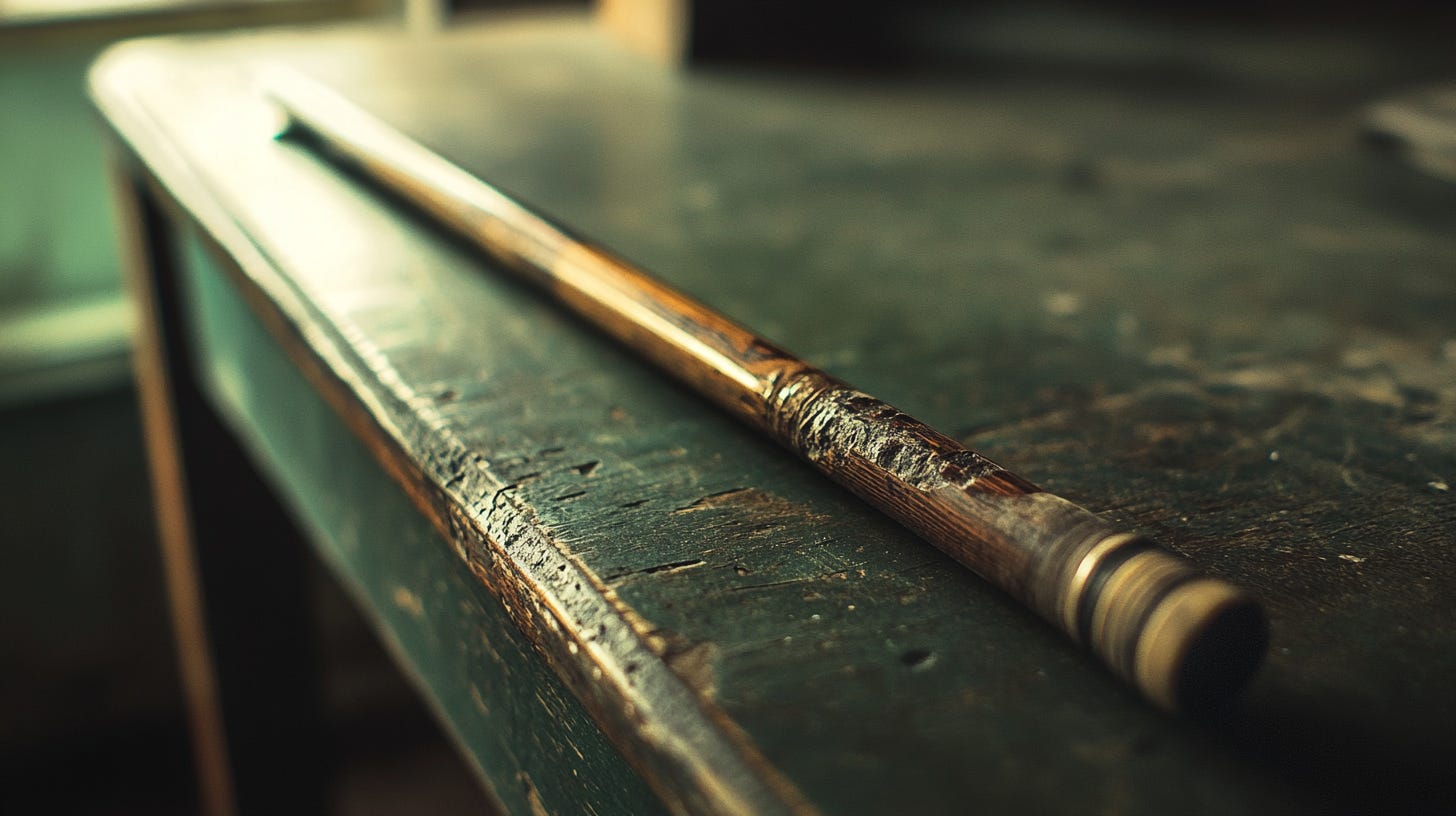I got to school early most days. My parents both worked retail, and Mum didn’t trust me not to leave the cooker on, or the door unlocked, or any one of the hundreds of things she’d worry about. So I waited in classrooms before anyone else arrived—quiet places where nothing happened, until it did. You learn early not to expect much. Especially from the people in charge.
Same Bruises, Different Wallpaper
At Deincourt, form classes were named like chemical compounds—three characters: a number for the year, two letters for your form teacher. Mine were 1PU, 2PU, 3TR, 4GR, 5GR. Same teacher for the first two years. Same teacher for the last two.
Deincourt had recently transitioned from being a Secondary Modern school to a newly minted Comprehensive. But it was a change in name only. A new Science block, some fresh signage—but the same old culture. The teachers taught like they always had—out of habit, out of spite, or maybe just because no one told them not to.
Some of them were good. Chris Twigg—if you ever read this—thank you. But too many clung to the old ethos: survive the day, maintain control, punish often. It wasn’t a place where sensitive kids like me thrived. I didn’t thrive—I endured. I learned early that seeking solitude in an empty classroom was safer than the playground or the school fields.
I got to school early most mornings. We left at eight, with Dad dropping me and my mum off at the bus stop at North Wingfield church. If we timed it just right, I’d be at Deincourt by 8:15.
I didn’t wait outside. Too exposed. Instead, I went straight to the geography room, which was also my form room. It was quieter there. Lonelier too—but that was the point.
One morning, I was bored. A stupid idea occurred to me: put a textbook on top of the door and wait for someone to walk in. It worked. The book hit Dave Roe on the head. He staggered, laughed, saw the humour in it immediately. Then he reset the trap.
For the next thirty minutes, we kept the game going. Sometimes it hit. Sometimes it didn’t. Sometimes someone would clock the silence in the room and open the door cautiously, or peek up and dodge it.
At some point, I felt it shift. Fewer people left to enter. The odds narrowing. I suggested that maybe we should stop. No one listened.
Bryan and Dave had been taking turns by then. Bryan had reset it the time before; Dave had done it just before PU walked in.
PU, our geography teacher, arrived in a rush, as usual. Shouldered open the door, tea in hand. The book dropped. Square on his head. His reaction was instant—rage, unfiltered. He kicked the book aside and scanned the room.
“Who did that?”
Dave was still on the move—caught mid-return to his desk, like a cricketer stranded between wickets. “Roe, come here!”
I hadn’t touched the book in a while. I’d already stepped away—my half-hearted pleas to quit while we were ahead having gone ignored. Still laughing. Still playing. Bryan said nothing at first. Just watched. Then, as PU turned away, he called out my name—too quickly, too eagerly. Like he’d been waiting for the moment. Like he enjoyed it.
I suppose self-preservation was the one subject that Deincourt taught well.
I tried to explain, but PU wasn’t in the mood for conversation. My mouth moved, but my feet stayed still, like standing still might soften what came next. He wanted blood.
He didn’t do it straight away. First, he told us to wait in the map room.
There was a side room—where he kept old worksheets, rolled-up posters, maybe maps. I never looked closely. The walls were half pinboard, half peeling gloss paint, and everything in there felt soft-edged, like memory worn down by handling. It wasn’t a secret place. Just a place where things happened—things that didn’t leave marks on the register, only on the kids.
He didn’t use a cane or a slipper. PU had a cut-down snooker cue—his own private tool for discipline, the grip worn smooth from use. It lived in the map room, like it was an optional part of the curriculum.
We stood inside—quiet, afraid. His beatings were the kind of thing people whispered about. My hands wouldn’t stop twitching. Dave kept looking at the floor.
Then something broke the fear—just a sliver. He worked his way through the register, one pupil at a time, but skipped our names. Moved right past them.
We caught each other’s eye. One of us whispered, “Here, sir.” We sniggered. Not because it was funny. Because it was the only thing between us and crying.
Then the door opened.
He beat us. I don’t remember how many times. Three? Six? Long enough to know it was for him, not for us. This wasn’t a lesson. It was release.
There was no paperwork. No escalation. No parent meetings. Just two boys, same bruises. Different wallpaper.
The emotional scarring took a little longer.



As we’ve discussed before, they really were brutal times in the 70/80s. The British education system has a lot to answer for. I often wonder if any of these teachers are still alive and if they’ve ever reflected on their actions, dare I say, regretted them. Thank God those days are over Robert. Great piece of writing as ever.
Robert, I'm sorry this happened. People who can't regulate themselves in positions of power are dangerous. And, it does have effects throughout our lifetime, those scars don't just leave. It was a well written story, one I wish you hadn't had to write. ❤️